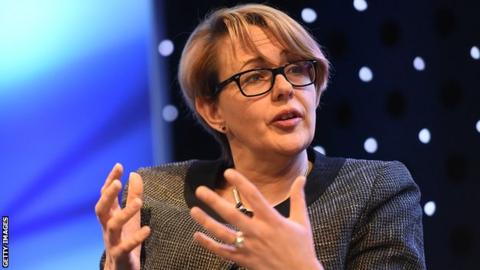
British Olympic and Paralympic sport must improve its athletes’ welfare, says Baroness Tanni Grey-Thompson.
The 11-time Paralympic gold medallist has authored a forthcoming report into the subject, which has been brought into sharp focus by recent claims.
British Swimming is the latest body to investigate claims of “bullying”, while several ex-riders have spoken of a “culture of fear” at British Cycling.
“We must prove we can win medals with a duty of care,” Grey-Thompson said.
Speaking at a debate organised by the BBC as part of its State of Sport coverage, she added: “We’ve proved we can win medals. I don’t think having a duty of care diminishes our chances of winning.
“We can’t make it all warm and cuddly – because that is not what elite sport is. But it is about getting the best talent and not leaving athletes broken at the end of it.”
Grey-Thompson’s report – due for publication “imminently”, she said – was commissioned by the Department for Culture, Media and Sport.
“There are some really good sports out there; there are sports that need to do much more,” she added.
“My report doesn’t mention a sport in particular, it doesn’t mention a particular person in it. It’s about the principles of how sport should be as we go forward.”
On Thursday, Wendy Houvenaghel became the latest high-profile cyclist to come forward with criticisms of British Cycling’s World Class programme – following Jess Varnish, Nicole Cooke and Emma Pooley.
Houvenaghel said a “medal at any cost” approach created a “culture of fear” at the the organisation, who she accused of “ageism” and having “zero regard” for her welfare.
Later on Thursday, the BBC’s sports editor Dan Roan exclusively reported on British Swimming’s investigation into multiple bullying claims, made by Paralympians about a coach.
Swimming was Britain’s most successful sport at the Rio Paralympics. The British team won 47 medals – 16 golds of 152 available – and set eight world records.
‘A wake-up call for sport in Britain’
Also speaking at Friday’s debate, UK Sport chief executive Liz Nichol described the athletes’ testimonies as “a wake-up call for sport”.
“We have to be much more aware of responsibilities, beyond the responsibility of helping athletes achieve what they all aspire to,” she said
“It’s clear it can be better, and it will be better. This is a big step-up for the Tokyo 2020 Olympics cycle.”
UK Sport is the funding body for Olympic and Paralympic sports in Britain.
When Nichol was asked whether linking funding to medal targets might have a negative effect on athlete welfare, she replied: “We don’t reward success, we invest in potential.
Speaking about British Cycling’s 39-point action plan response to failures identified in a leaked draft report into its World Class Programme, Nichol added: “This is something that is very significant.
“Every sport can learn from it and every sport should be looking at the cycling plan and checking to see if they are doing things properly.
“Yes it is uncomfortable, but it is right that athletes are speaking out. And it is right that we all acknowledge that something has got to change – and it will change – over this next cycle.”
‘It’s not an issue of welfare or medals’
Helen Richardson-Walsh, who starred as Great Britain won Olympic hockey gold in Rio, said she had seen “big changes” in athlete welfare over her career.
“Gone are the days where you would get shouted at on the sideline at international level. I don’t think that’s acceptable in society any more and it is kind of being phased out in sport,” the 35-year-old said.
“What we developed as a team in the last two Olympic cycles was so far removed from that old fashioned in your face coaching and we were more successful.
“You don’t need to go down that route to win. It’s not an issue of welfare or medals.”



